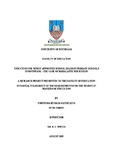| dc.contributor.author | Bathuleng, Tshupo B. | |
| dc.date.accessioned | 2016-07-14T12:48:51Z | |
| dc.date.available | 2016-07-14T12:48:51Z | |
| dc.date.issued | 2016-07-14 | |
| dc.identifier.uri | http://hdl.handle.net/10311/1453 | |
| dc.description | A dissertation submitted to the Department of Educational Foundation, Faculty of Education, University of Botswana in partial fulfilment of the requirements for the degree in Masters of Education, Citation: Bathuleng, Tshupo B. (2015) Induction for newly appointed school heads in primary schools in Botswana – the case of Mahalapye sub-region, University of Botswana | en_US |
| dc.description.abstract | The purpose of this study was to determine whether induction is necessary in order to reduce the challenges faced by novice school heads in Botswana. The ultimate goal of the study was to come up with strategies that can be employed in order to develop a well- structured induction programme for novice school heads in Botswana.
A qualitative approach was used whereby a case study design was the most appropriate for the study. A purposive sample of six novice school heads, six deputy school heads in primary schools were selected from Mahalapye Sub Region and two officials from the Ministry of Education and Skills Development (MOESD). The data was collected through face to face interview from novice school heads and deputy school heads, including document analysis as well as semi structured questionnaire for the MOESD officials. The study indicated that novice school heads in Botswana primary schools are not inducted hence they face several challenges. As a result the findings indicate that novice school heads face the following challenges; lack of skills in leadership and management, lack of skills in financial management and staff appraisal. The study further revealed that there is inconsistency on the provision of induction for novice school heads and that there is lack of support and supervision offered to novice school heads by their supervisors. Despite these, the study revealed that novice school heads employed some coping strategies to deal with the challenges such as networking, and even using available records found in their offices. In conclusion it is evident that there is no established induction programme for novice primary school heads in Botswana.
Some recommendations made by the study are that the MOESD must establish a policy guideline for induction to be used by regions to develop induction programme for the novice school heads. In addition, the new strategies are that the induction should be done at Regional level then to specific schools. The programme should include the following; mentoring, networking, workshops and conferences for new school heads. It may be ideal for the Ministry to engage retired school heads through contract.
This study was carried out on a limited scale and the findings of the study cannot be used to generalize induction for newly appointed school heads in Botswana. Instead a similar study can be undertaken using a bigger sample across the regions in which more schools will be included | en_US |
| dc.language.iso | en | en_US |
| dc.subject | Induction | en_US |
| dc.subject | School Heads | en_US |
| dc.subject | Primary schools | en_US |
| dc.subject | Mahalapye sub-region | en_US |
| dc.subject | Botswana | en_US |
| dc.title | Induction for newly appointed school heads in primary schools in Botswana – the case of Mahalapye sub-region | en_US |
| dc.type | Masters Thesis/Dissertation | en_US |
| dc.link | Unpublished | en_US |

